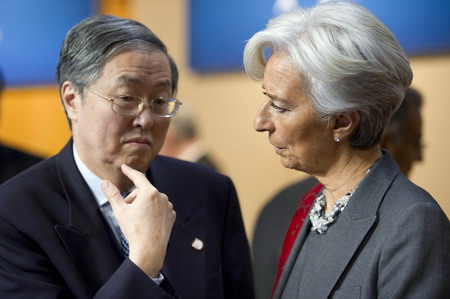-
News >Bizchina
Yuan reform pace remains 'unchanged'
2011-02-21 09:31
Central bank governor Zhou Xiaochuan talks with France's Finance Minister Christine Lagarde at a G20 meeting in Paris on Saturday. [Photo / AFP]
Internationalization of Chinese currency has to proceed 'gradually'
PARIS - China's pace in internationalizing its currency remains "unchanged" despite calls on the country to quicken the process, central bank chief Zhou Xiaochuan said.
Yuan internationalization would see the currency play a greater role in world trade and become a globally accepted means of payment.
Zhou, governor of the People's Bank of China, said China insists on a gradual process to internationalize its currency and there is no change in position since his bank announced the policy in 2009.
"The topic is quite complicated and we have no new announcement so far," Zhou told China Daily when he attended the two-day meeting of G20 finance ministers and central bank governors in France, which ended on Saturday.
The meeting agreed on a list of technical indicators to track trade and currency imbalances - caused by some countries spending more while others saved - but left the more tricky questions, concerning when those imbalances actually become dangerous and what to do to mitigate them, for later.
According to the G20 communiqu, indicators will focus on public and private debt, fiscal deficits and private savings rates.
French Finance Minister Christine Lagarde, who chaired the G20 gathering, said agreement "wasn't always simple", but had resulted in a text that was "balanced and demanding as regards its implementation".
Since the global financial crisis, major economies including China and Russia have called for less dependence on the US dollar in international trade and investment, and accelerated steps to promote their own currencies on a global basis.French President Nicolas Sarkozy came up with an ambitious agenda to reform the de facto US dollar-dominated global monetary regime and wanted to put the Chinese yuan into the basket of global reserve currencies.
However, there was no progress at the two-day conference on the yuan internationalization roadmap though the international community are encouraging the world's second-largest economy to take quicker steps.
Lagarde said reform of the global monetary system will be under the mandate of Germany, which is organizing a team to examine the issue within the G20.
Beijing has shown interest in discussing global monetary reform and Sarkozy said on Friday that China will hold a seminar on the subject at the end of March.
Xia Bin, an academic member of the central bank's monetary policy committee, said the process of yuan internationalization needs to be promoted gradually, but it also depends on greater exchange-rate flexibility for the yuan, and a loosening of capital control.
Louis Kuijs, a senior economist at the World Bank China Office, said earlier that China should not relax capital-inflow controls any time soon, but should wait until the currency regime became more flexible.
A report by HSBC showed that a growing number of domestic and international enterprises are willing to use the yuan for settlement.
In April 2009, the State Council decided to set up pilot projects in five cities to use the yuan for settlements of trade with Hong Kong, Macao and members of the Association of Southeast Asian Nations. It was expanded to 20 provinces and cities about a year later. On Dec 15, the yuan was directly traded abroad for the first time at the Moscow Interbank Currency Exchange, viewed as a milestone on the way to the currency's internationalization.
The central bank also launched a pilot program on Jan 13 to allow domestic companies to use the yuan to settle direct outbound investment for new ventures, mergers, acquisitions and stake purchases overseas.
In addition to quickening the process of renminbi internationalization, China has also faced mounting external pressure to appreciate its currency.
Analysts said deciding the currency's value will not be a simple task.
"So we will keep the yuan exchange rate basically stable whilst improving the flexibility of the currency regime," Zhou said.
The yuan exchange rate against the US dollar was 6.5781 on Friday, a 17-year record high. The currency has appreciated against the US dollar by almost 4 percent since June.
